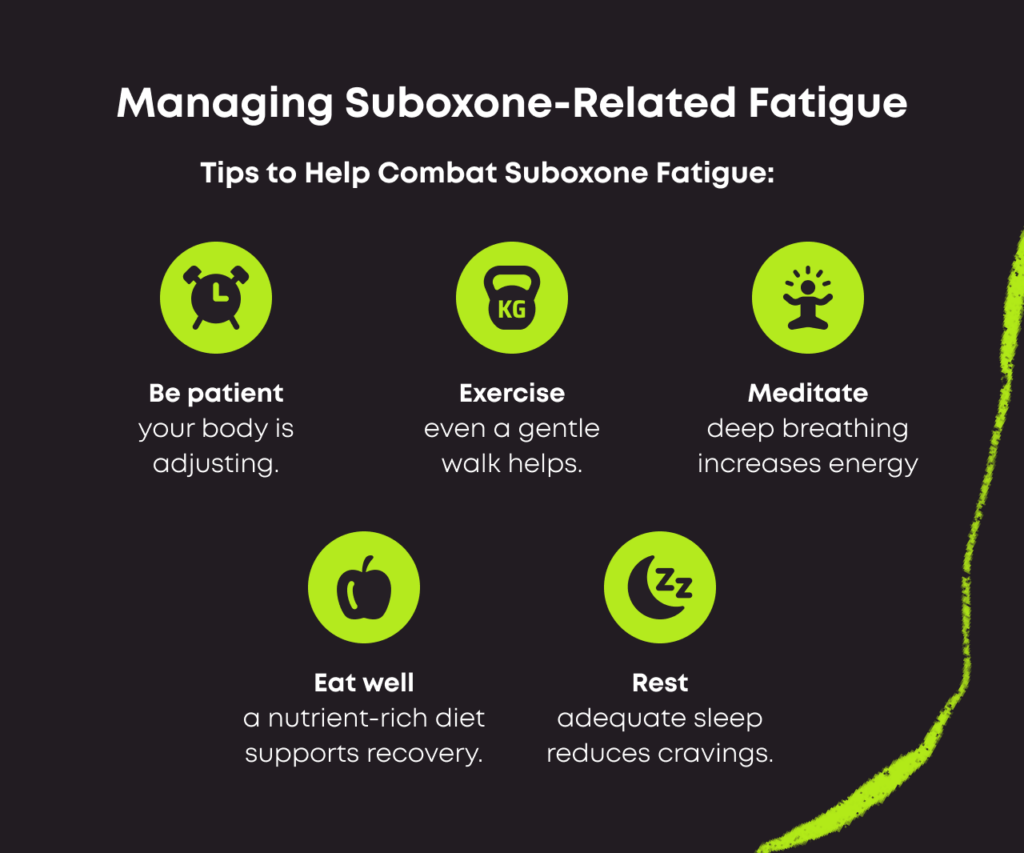Some people feel drowsy, sedated, or sluggish when they take their first doses of Suboxone. Nausea and headaches caused by Suboxone could also make you feel tired. Thankfully, most people overcome this issue quickly.
Buprenorphine, a key ingredient inside Suboxone, is an opioid. All medications in this class can be sedating, especially when your body isn’t accustomed to them.
Doctors also need time to titrate Suboxone doses. If you take too much, you can feel very sleepy. If you take too little, your cravings may become overwhelming.
If you feel sleepy, talk with your doctor. And deploy some patience and self-care practices to help you feel better as your body adjusts.
Why Does Suboxone Make You Tired?
Sleepiness is listed as a potential Suboxone side effect in documents created by the U.S. Food and Drug Administration.[1]
Suboxone activates the opioid receptors in the brain, so in some ways, it works similarly to other opioids, but without causing a high.
As a partial opioid agonist, buprenorphine is weaker than full opioid agonists, such as heroin and methadone.[2] It won’t slow breathing and heart rate to the same degree as these full opioid agonist drugs, but it can still have a somewhat sedating effect. This is why you may feel a bit tired when you first start taking Suboxone.
As your body adjusts to the consistent presence of the medication, this side effect will lessen. After a few days or weeks, you likely will no longer feel tired due to Suboxone.
Factors That Can Impact Fatigue
Like all medications, Suboxone doesn’t affect everyone in the same way. Some people experience little to no drowsiness or fatigue when they start Suboxone therapy, whereas others may feel quite tired in the first few days of treatment.
These factors could impact your energy level while on Suboxone:
- Genetics
- Age
- Sex
- Metabolism
- History of substance use (including the type of opioid used and the duration and intensity of use)
When you start taking Suboxone, monitor your symptoms, observing how the medication affects you. You shouldn’t drive or operate other heavy machinery until you know how Suboxone affects you.

How Can You Reduce Suboxone-Related Fatigue?
Lower energy levels and sleepiness can be difficult to manage in the early phases of recovery. Remember that you are just starting your journey to recovery, and there is an early adjustment period.
Here are some tips to help you manage Suboxone-related fatigue:
- Be patient. When you first begin any new medication, including Suboxone, your body needs time to adjust. Though you may feel tired now, this symptom will likely lessen significantly within a few days or weeks.
- Exercise. Though it can seem counterintuitive, exercise can help to combat fatigue. Even a gentle walk can help offset some of the drowsiness you feel. In one study, study participants experienced a greater reduction in fatigue after a short exercise session than when they consumed 50 mg of caffeine.[3]
- Try meditation. Deep breathing can also help you to feel refreshed, increasing energy levels and improving focus abilities.[4] Taking a few moments to breathe deeply can increase blood flow and reduce overall stress. Adding gentle stretching, such as yoga poses, can increase the benefits.
- Boost your nutrition. Your treatment team can help you design a healthy eating plan that supports your overall health and recovery goals. A diet rich in nutrients will help you to feel better and boost energy levels.
- Rest. While your body adjusts to Suboxone and life in recovery, sleep is incredibly important. A study on the effects of sleep in those in recovery from substance use disorder (SUD) found that higher amounts of sleep were directly correlated to lower cravings for opioids.[5]
If you are concerned about the possibility that Suboxone is causing you to feel over-sedated or fatigued, talk to your healthcare provider. They might be able to adjust your dosage schedule and will help you determine if a change in your treatment is needed.
Sources
- Suboxone Prescribing Information. U.S. Food and Drug Administration. https://www.accessdata.fda.gov/drugsatfda_docs/label/2021/022410s042lbl.pdf. March 2021. Accessed January 2022.
- Buprenorphine. Substance Abuse and Mental Health Services Administration. https://www.samhsa.gov/medication-assisted-treatment/medications-counseling-related-conditions/buprenorphine. March 2022. Accessed January 2023.
- Exercise Versus Caffeine: Which Is Your Best Ally to Fight Fatigue? Harvard Health Publishing. https://www.health.harvard.edu/blog/exercise-versus-caffeine-which-is-your-best-ally-to-fight-fatigue-2017060811843. July 2017. Accessed January 2023.
- Yoga, Meditation Improve Brain Function and Energy Levels, Study Shows. University of Waterloo. https://www.sciencedaily.com/releases/2017/09/170906103416.htm. September 20170. Accessed January 2023.
- Sleep Quality and Emotions Affect Opioid Addiction Recovery. Penn State. https://www.psu.edu/news/research/story/sleep-quality-and-emotions-affect-opioid-addiction-recovery/. January 2017. Accessed January 2023.

Reviewed By Peter Manza, PhD
Peter Manza, PhD received his BA in Psychology and Biology from the University of Rochester and his PhD in Integrative Neuroscience at Stony Brook University. He is currently working as a research scientist in Washington, DC. His research focuses on the role ... Read More
Download Our Free Program Guide
Learn about our program, its effectiveness and what to expect
Related Content
Imagine what’s possible on the other side of opioid use disorder.
Our science-backed approach boasts 95% of patients reporting no withdrawal symptoms at 7 days. We can help you achieve easier days and a happier future.